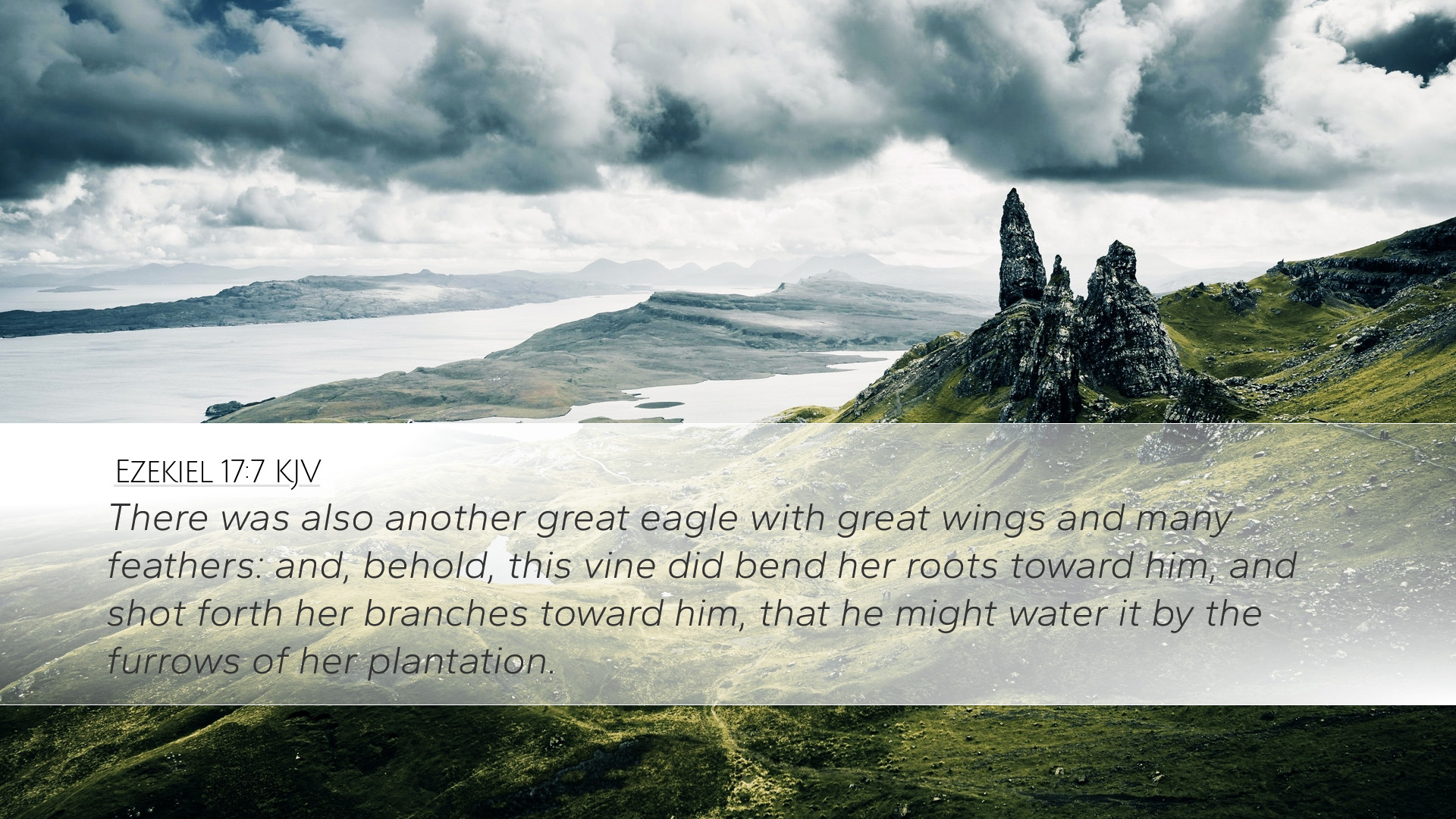Ezekiel 17:7: "And there was another great eagle with large wings and many feathers; and behold, this vine bent its roots toward him, and shot forth its branches toward him, that he might water it from the furrows of its plantation."
Introduction
The prophetic visions of Ezekiel are laden with rich symbolism and intricate messages. In Ezekiel 17:7, we encounter a profound illustration that uses the imagery of two eagles and a vine, shedding light on the political and spiritual state of Israel during and after the Babylonian exile. This commentary aims to delve into the meanings behind the symbols used, drawing insights from esteemed public domain commentators such as Matthew Henry, Albert Barnes, and Adam Clarke.
Contextual Background
Understanding the context of Ezekiel's prophecies is vital for deciphering their meanings. Written during a time of great turmoil for Israel, Ezekiel addressed the socio-political realities of a nation in exile. The imagery of the eagles symbolizes power and authority, while the vine represents the people of Israel, dependent on external sustenance and the covenant promises of God.
Symbolism of the Eagles
Henry reflects on the significance of the two eagles in this verse, emphasizing that they represent two powerful entities: the Babylonian empire and Egypt. The first eagle, often understood to symbolize Nebuchadnezzar, provides the Israelites with a precarious stability that is laden with threats and eventual destruction. The second eagle, with its large wings and many feathers, can be construed as Egypt, which is portrayed as a source of attempted salvation and support by Israel's leadership.
Barnes elaborates further, indicating that the intense focus of the vine towards this second eagle reveals Israel's misplaced trust. Instead of relying on Yahweh, they sought aid from earthly powers, demonstrating a lack of faith in God's ability to deliver them.
The Vine's Actions and Implications
The vine’s action of bending its roots and branching out signifies both an acknowledgment of its need for sustenance and a metaphor for its alliances. Clarke notes that this imagery illustrates Israel’s spiritual state—its inclination to seek physical relief rather than divine intervention. This dependence is a spiritual ailment that separates them from God's covenant promises.
Moreover, the depiction of shooting branches towards the eagle signifies a deep-rooted desire for reliance on external forces, which ultimately leads to spiritual decay. As Henry states, their choice reflects a fundamental misunderstanding of where their help should truly come from.
Theological Reflections
This passage raises essential theological themes relevant to the life of believers. First, the danger of misplaced trust is a poignant reminder for modern readers of the Bible. Just as Israel looked to Babylon and Egypt for help, today’s believers may be tempted to rely on worldly systems and leaders instead of turning to God. Barnes stresses the importance of recognizing the ultimate authority of God amidst earthly turbulence.
Second, the symbolism of the vine reflects the nature of God’s covenant relationship with His people. Just as the vine needs a robust trellis for support, believers require a steadfast connection to God’sWord for spiritual vitality. Clarke points out that believers should bear in mind that true sustenance comes from remaining rooted in Christ, the true vine (John 15:5).
Practical Application for Pastors and Scholars
The rich symbolism within Ezekiel 17:7 encourages pastors, students, and theologians to reflect critically on issues of dependency and faith in their ministries and scholarship. Below are some practical lessons drawn from this passage:
- The Need for Discernment: Just as Israel needed discernment in its political allegiances, contemporary churches must be cautious about whom they align with culturally and politically.
- Teaching Dependence on God: It is a pastor's duty to teach congregants about the importance of relying on God rather than on institutions or systems of human design.
- Understanding God’s Sovereignty: The reminder of God’s control over nations and his ability to deliver should inspire confidence in pastoral leadership and encourage faith among congregants.
- Encouraging Spiritual Vitality: Like the vine, churches are called to remain connected to Christ, ensuring that worship and teaching encourage a vibrant spirit led by Scripture.
Conclusion
Ezekiel 17:7 serves as a compelling portrayal of Israel’s spiritual state and the dangers of misplaced trust. Through the intricate symbols of the eagle and the vine, the text underscores the critical need for dependence on God alone for sustenance and salvation. As students and scholars explore this passage, it becomes clear that the lessons of faithfulness, dependence, and divine sovereignty are as relevant today as they were in the time of Ezekiel. The call to deepen our trust in God amidst societal temptations echoes loudly, offering a timeless message of hope, reminders of the danger of idolatrous alliances, and a reassurance of God’s faithful covenant with His people.


